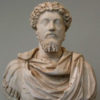Stoicism did have ‘enlightened’ Stoics. The goal of a Stoic was to become a Sage. A Sage was someone who sees reality clearly, and is troubled by nothing. He is thus empowered to impart this knowledge to others, as well as always being able to take the right action. They did in a sense have monks who engaged in an ongoing process they called “askesis.” A constant ongoing inquiry, and minimizing any activity that isn’t inquiry.
In dialogue with others? Oh yes, the Stoic wasn’t a hermit, neither was the Cynic though people wished they were. The difference between the Stoic and the Cynic were pronounced.
Would it be accurate to say that being a hermit would be counterproductive to either trains of thought? A hermit wouldn’t have contact with others, and thereby would have no opportunity to challenge and be challenged. Yes, that is correct, and is part of why they met in what amounted to a public square. They were people watching.
No meditation at all in the Stoic practice? Actually, a lot of meditation to help clarify thinking, and process a discussion/argument. They tended to meditate on observations and precepts they believed were demonstrations of truth. Ever see the movie Dune or read the book? Their meditative practice was similar to that of the Mentats.
I think Stoicism is still around in some form? It still is in a denatured and decentralized form. But if someone sought formally to embrace it, it could legitimately be the basis of a revival and not totally off base. But most who would revive Stoicism would reject Stoic spirituality. It would make their truth and reality too mystical. They prefer a dead soulless matter view, and that is not how Stoics saw things, not the originals.
Tainted by the ‘scientific revolution’? Yes, so Stoicism has been corrupted, but it isn’t totally lost to us. Deists tend to be sort of like classic Stoics, but many deists are also to some degree agnostic which is not a Stoic view.
How did Stoicism get tainted by the scientific revolution? I would think they have the same end goal? In Stoicism, God is in the machine, and the universe is alive. In the scientific revolution the universe is a machine, and dead except for what we call life, which may also be little different from the dead. Stoics focused on the whole, and they would call an obsessive focus on heuristic thinking a baseless distraction. Basically a waste of time.
We lost it with our fixation on lateral thinking. That’s true. Perhaps interesting trivia, the Roman Empire was capable of canning food like we do, but they would not can food for the same reason. It was seen as a waste of time. The Romans and Greeks had a solid pragmatic streak. In the case of canning, they could make clay jars cheaply and easily, and seal them just as easily. Whereas metal would be more work and complex to seal. They knew how to do it, but it was just seen as too much of a bother. So many of our supposed advances are really more of a value judgment than anything. The medieval Moors preformed very successful c-sections, and their survival rate for females was by comparison very high.
You mean we allow or reject based on values? Yes, and the US President Bush actually had to have one of his policies repealed by Obama. Obama actually had to order that the Presidential office adhere to scientific fact. Stem cells and other matters. Much of the ecological issue too, and the issues behind bio-engineering.
It’s interesting to examine what we ‘can’t do’, and see that it may be because of values then any actual limitation.
Your thoughts are welcome. Be well friends.
Travis Saunders
Dragon Intuitive
~science,mysticism,spirituality~



Leave a Reply